- Home
- Tamora Pierce
Squire Page 12
Squire Read online
Page 12
“I hear the two Yamani ladies with the princess aren’t spoken for,” Lerant said, grinning at Dom. “Thinking you might wangle an introduction, Sergeant Domitan?”
“I hoped my good friend Kel might take pity on me,” Dom replied with a wink for her.
Kel’s heart turned over in her chest, just as it did whenever he noticed her. It wasn’t fair for Dom to be so good-looking, she thought, or worse, so nice.
“I still prefer—” Raoul was saying when a sodden messenger walked into the tent. He clutched an oilcloth envelope in his hand. Kel took it, noting the seal: a crossed gavel and sword. Where had she seen that before?
The parchment inside, also sealed, was addressed to her knight-master. She handed it over. Raoul frowned, then broke the seal as Kel ushered the messenger outside.
She made sure he and his mount were cared for, then returned to the meeting tent. The men were leaving.
“Here’s Kel,” Dom said. He chortled as he clapped Lerant on the back. “Two exotic Yamanis, one for you, and one for me,” he told the younger man as they walked away.
“We’re going to Corus?” Kel asked Raoul.
He gave her the parchment. “They’ve found who paid those two rogues to kidnap your maid in April,” he told Kel. “We’re going back for the trial.”
December, in the 17th year of the reign of Jonathan IV and Thayet, his Queen, 456
eight
THE PRICE OF A MAID
The trip to Corus was hard. Outside the Royal Forest the rains that had turned the roads into rivers of mud became snow that deepened with every step. Warhorses were sent ahead of the riding horses to break the trail. Kel worried about that, but Peachblossom did his part without sharing his displeasure.
Some weeks before Kel had acquired a big leather pouch for the griffin to travel in during bad weather. Always worried about his health and how much cold and wet he could stand, she had lined the pouch with fleece to keep him warm. Inside the Royal Forest, even this wasn’t enough. When she checked him at mid-morning on their second day, the small immortal sat huddled, feathers fluffed out. Gathering her courage, Kel unwound her thick wool scarf, unbuttoned the heavy quilted coat issued by the quartermaster, and opened the top of her fleece-lined jerkin. She took the griffin from its pouch with gloved hands, thought a prayer, and slid him into the front of her jerkin between the fleece and her wool shirt.
“If you savage me, it’s back to the pouch for you,” she informed her guest, shifting him so his head poked out of her jerkin and coat. The griffin’s answer was to tug his head inside the jerkin. Kel rebuttoned her coat and put her scarf on again, leaving a small opening so the griffin could breathe. Either he did not want to return to the pouch or he was so cold he didn’t want to do anything at all, even draw Kel’s blood. He remained inside her clothes for the rest of the trip.
During the slow ride Kel had time to remember the events of last April. Her old rage at the injustice of it returned. Someone had paid thugs to kidnap Lalasa the night before Kel was to take the great examinations. After holding Lalasa—and Jump, who had refused to leave her—all night, the kidnappers had taken her to the top of Balor’s Needle, the tallest structure in the palace. They left her bound, gagged, and blindfolded on the exposed observation platform. Jump was tied up there, too.
If Kel searched for them, she risked being late to the tests. The rules were clear: pages who were late would have to repeat at least one year, perhaps all four, of their page terms, depending on how late they were. The one who’d paid for the kidnapping had bet that Kel would do her duty by Lalasa and Jump and search for them, then give up her dream of a knight’s shield rather than repeat her page years. If Kel had left the matter to people who didn’t owe Lalasa protection, like the palace Watch, the whole world would learn she had shirked her duty.
As if that weren’t bad enough, the kidnappers, or the one who paid them, had waited until Kel walked onto the observation platform, then locked the door to the inside stair of the tower. Their employer knew Kel’s terrible fear of heights. Lalasa, Jump, and Kel were forced to descend the outer stair. With Lalasa’s help Kel had done it, and lost her fear of heights as well.
The actual kidnappers were caught by the palace dogs before they left the grounds. Now the Watch had found the kidnappers’ employer. Kel wanted to see his face. She wanted Lalasa to get justice after being terrorized for no better reason than she worked for the wrong person.
They reached their headquarters in a winter twilight two days after the trial started. Lalasa and her close friend Tian were already waiting for them, seated on a bench in the hall outside Raoul’s and Kel’s rooms. They took one look at the snow-soaked, weary knight and squire and went into action. They sent orders for hot water, tubs, and food for humans and animals. Then they swept into Raoul’s and Kel’s rooms. As the dazed pair watched, they lit candles, built fires in every room, put out fresh clothes, and began to strip Raoul and Kel of their wet things. Only when they reached underclothes did Raoul recover enough to retreat to his own dressing room to await the arrival of his bath.
Kel watched, too exhausted to protest, as she settled the griffin on his platform and set it by her fire. Technically Lalasa was no longer her maid, and Tian had never been in her service, but it was so nice not to have to do anything but what she was told. At last Kel settled into a tub full of hot water to soak off the road’s grime. Lalasa fed the sparrows and Jump, and directed the wing’s servants at setting out food in Raoul’s dining room.
They couldn’t get either woman to share supper, but Lalasa and Tian agreed to join them in cups of hot cider before the hearth in Raoul’s study.
“How far has the trial come?” Raoul asked the two young women.
Lalasa smoothed her neat white linen apron with fingers that trembled. “The men have given their evidence,” she said quietly. “They followed the man who hired them in case he chose not to pay them after. I do not properly understand why it took so long for this man to be captured, but they hold him now in the waiting room reserved for nobles.”
Raoul shook his head. “I bet he was holed up on his estates and didn’t come out before now. The Crown’s having a lot of trouble reducing that set of noble privileges. On his own lands, a noble is untouchable.”
“Excuse me, my lord,” Tian said quietly, “but why did he leave, then? Surely he did not need to do so—”
“Unless he wished to earn his knighthood,” Lalasa interrupted, her voice hard. She looked at Kel. “He has not been named, but servants talk. Sir Paxton of Nond has attended each day. So too has Ebroin of Genlith, who is the Corus steward and representative of Lord Burchard of Stone Mountain.”
When Kel saw who the noble culprit had to be, she almost laughed. Paxton of Nond was the knight-master of Joren of Stone Mountain, Kel’s old foe. Of course it would be Joren. He’d pretended he had changed as a squire. She had wondered if that were so. Now she knew.
“His father’s steward?” murmured Raoul, as much to himself as to the three young women. “Not his father?”
Tian coughed delicately. “I heard one of the Stone Mountain men-at-arms say the old lord refuses to treat this as if it means anything.”
“That sounds like the old stiff-rump,” said Raoul. “If arrogance were shoes, he’d never go bare-foot.” He looked at Kel. “You don’t seem surprised.”
“I’m angry,” Kel replied, her voice soft, one fist clenched. The others stared at her, startled. Kel rarely showed temperament of any kind. “Whatever was bad there, it was between me and him. He didn’t care about Lalasa or Jump. He didn’t care who got hurt, so long as he could fix me. And to put a smile on his face, and tell me how I might get a husband, when he was groping for a plan like this . . . !” She got to her feet, unable to sit any longer. “Lalasa, Tian, thank you. My lord? If you’ll excuse me, I need to think a bit.”
Raoul nodded. “Kel . . .”
She bowed to him and retreated to her rooms, closing the door firmly behind her.
Joren, she thought, clenching her fists. This time he’s gone too far. He’ll pay for it. The Crown will see to it he does. Lalasa and Jump will have justice. And when it’s over? He can pay some blood to me, when all the legal chants and dances are done.
Forcing herself to sit quietly in Duke Turomot of Wellam’s courtroom, Kel wondered if the withered-persimmon look on the Lord Magistrate’s face was permanent. Perhaps it was. He had been sour in the spring, when he’d announced that because someone paid ruffians to make Kel late to the big exams, she would be allowed to take them alone. Now that she thought of it, he’d never smiled during the year-end exams, either. So it wasn’t just this case that had turned his expression pickle-sour, though it made her insides feel like he looked.
Kel watched Turomot from the bench reserved for the wronged party. She had Lalasa on her right; Jump sat between them on the floor. Lord Raoul was a solid bulwark on Kel’s left.
Behind them sat Kel’s parents, her brother Inness, Tian, and Lalasa’s uncle Gower. Neal, Cleon, and Prince Roald, who had arrived from Port Legann, were there. Lord Wyldon of Cavall came. Kel had expected him: the training master had taken the kidnapping personally.
Across the aisle was Paxton of Nond, Joren’s knight-master, a tired, anxious-looking man in his early thirties. On his right was a sleek, dark-haired man in his forties, elegant in gray tunic and hose. Lalasa murmured that he was the Stone Mountain steward, Ebroin of Genlith. With him was an advocate in a white overrobe and a large black skullcap; he was white-haired, mustached, and clever-looking.
“Master Advocate Muirgen of Sigis Hold,” Raoul whispered when Kel asked. “He’s very good—the best money can buy.”
“There’s little he can do when everybody knows Joren is guilty,” Kel said, her own voice as soft as his.
Raoul frowned and opened his mouth to speak, but was cut off when Duke Turomot struck a bronze disk with a polished granite ball. Everyone rose for the prayer to Mithros, then sat in a rustle of cloth.
Duke Turomot scowled at Kel. “These proceedings are a matter of law, not of noble privilege. Should you have challenges to issue, make them elsewhere. We—”
The Watchmen on guard outside the courtroom doors threw them open. One stepped in to announce, “His royal majesty, King Jonathan the Fourth. Her royal majesty, Queen Thayet.”
Everyone rose as the sovereigns walked down the center aisle. Women in skirts sank into curtseys; the men and Kel bowed deeply. Two thronelike chairs, part of every court’s furnishings, stood on the magistrate’s dais to his right. Normally they were empty, reminders of royal dominion. Today the king and queen went to them and sat. Only when they nodded to Duke Turomot did he resume his own seat, two red rage spots high on his cheekbones. The audience sat when he did.
Kel wasn’t sure why their majesties had come, but she could ask Raoul later. He would know.
Duke Turomot’s clerk, whose desk was at the foot of the magistrate’s dais, stood. To the Watchmen who guarded the common prisoners’ chamber off the side of the courtroom he said, “Admit the convicted commoners.”
The Watchmen brought out two men in shackles. The clerk read from a sheet of parchment, “Let the record show that the convicted witnesses, Ivath Brand and Urfan Noll, have entered the chamber,” he said. “In exchange for their testimony, their fifteen-year sentences to the mines will be reduced to ten.”
Kel clenched her hands. Reduced? They should be laboring in mines or sweating and freezing to clear roads, anything, for more than fifteen years, not less. They had no right to sit in this warm room with Lalasa! Her mind knew that few people lived more than eight years at hard labor, but her heart wanted them to bear each and every moment of punishment they had earned, with no reductions, even if they weren’t alive to serve the entire sentence.
“Proceed, Master Hayward,” ordered Duke Turomot.
“Admit the noble prisoner,” Clerk Hayward called.
The Watchman on duty at another side door opened it. Out came Joren of Stone Mountain, the same beautiful young man Kel remembered. Although even Kel could see that brown and yellow, his knight-master’s colors, were not the best for him, he still looked like an unachievable dream of perfect manhood. He bowed to the monarchs and to Duke Turomot, then went to the bench occupied by Ebroin of Genlith and the advocate. He sat without so much as glancing at Kel or Lalasa.
Every muscle in Kel’s body went rigid. He’s here to pay for this, she told herself, clutching her self-control. He can’t shrug this off. He won’t.
“Ivath Brand and Urfan Noll, do you see the man who paid you two gold nobles to kidnap Lalasa Isran?” demanded Clerk Hayward.
Both convicts pointed to Joren. The clank of their chains made Kel look at Joren’s wrists and ankles. He had not been chained. Arrest didn’t seem to have inconvenienced him much. That will change, she thought furiously.
The sleek man rose. “If I may speak, my lord Duke.” Turomot nodded. “I am Ebroin of Genlith, steward for his Corus properties to Lord Burchard of Stone Mountain, father of Joren of Stone Mountain. As my lord is in the north and unable to reach the palace at present, I stand in his place. With me is Master Advocate Muirgen of Sigis Hold, licensed to speak in law in Tortall, Tyra, Maren, and Galla. He will serve on Squire Joren’s behalf.”
“I know Master Advocate Muirgen,” said Duke Turomot as that man bowed to the monarchs and to him. “He may speak as required.”
Ebroin sat. The Master Advocate spread his hands, jeweled rings accenting his movements. “Your majesties, my Lord Magistrate, the testimony of convicted men in such matters is a jest. They give Squire Joren’s name to please the Watch interrogators; they had to offer a truly big fish to justify any change in their sentence. They—”
“Yatter on, you cake-mouthed money britches,” snarled Urfan. “We knows who paid us”—the guard beside him cuffed his ear; he continued despite the blow—“noble or not—” A second, harder cuff shut him up.
The Master Advocate looked at the shackled men as if they were something nasty that clung to his shoe. “Need we include the common element?” he asked. “They have identified Squire Joren, rightly or wrongly.”
Duke Turomot nodded. The Watchmen escorted the prisoners out of the room.
“No evidence connects Squire Joren to this tawdry affair,” began the Master Advocate.
Duke Turomot raised a leather envelope that dripped with wax seals on ribbons.
“The map of the palace he made for those men,” Lalasa whispered to Kel.
“I object to the use of law court mages to determine the truth of Squire Joren’s testimony,” continued the Master Advocate. “They would not practice inquiry magic if they were fit to make a decent living—”
“Oh, stop this currish babble.” Joren’s cold, clear voice brought all eyes back to him. “Ebroin and Muirgen have talked at me for days. I’m weary of it.” He looked at Duke Turomot. “I paid those idiots to steal the wench and stash her on Balor’s Needle. I paid a—”
Muirgen and Ebroin darted to Joren. Kel glanced at Sir Paxton: the knight sat with his head in his hands.
“Squire, Master Joren, I beg you, not another word,” Ebroin said hurriedly. “Think of your family, the smirch to your honor. There are ways to handle—”
Joren shook off the steward’s restraining hand. “For a man who comes from a great family, you talk like a merchant. My honor?” His voice rang throughout the courtroom. “What honor has a nation when a female lives among men and pretends to their profession of arms? What honor is there in forcing a good, brave knight like Wyldon of Cavall, a hero of the realm, to accept this creature into training and to allow her to continue?” Kel, humiliated and infuriated, stared at the floor.
“I was not forced, Joren,” Lord Wyldon told him. “She earned her right to stay, as much as—more than—you lads. Against odds that might have broken one of you.”
“I understand you are honor bound to say so, my lord,” Joren said quietly. “The conclus
ions I draw are my own.”
You still don’t believe him, thought Kel. Though you know as well as I do that it would just about kill Lord Wyldon to lie. She raised her head to stare at Joren. She didn’t want him thinking she couldn’t face him.
He spat on the flagstones in front of her and faced Duke Turomot. “I had her coming and going. Either she failed in her duty to her servant—and I’d have made sure the world knew the wonderful Keladry had shirked her first obligation as a noble—or she’d be so late she’d have to repeat the whole four years. No one would do that.”
Except me, Kel thought, staring at that blond head. I would have done it, just to spite you.
“My lord Duke, you and the other examiners made allowance for her, because certain interests in this kingdom mean her to succeed. You allowed her to take the big examinations alone. Of course, she passed.” Joren crossed his arms over his chest. “So. I paid those men. I give you leave to sentence me under the law.”
Duke Turomot leaned forward. He looks like the griffin about to hiss, Kel thought. “You are fortunate that, by law, a magistrate may not challenge for insult, Joren of Stone Mountain. I submit you knew that much before you found the courage to say such things of me and my examiners. But Mithros waits in judgment, you arrogant puppy. You may twist our law to suit you, but he weighs your every act, and will find you wanting.” He sat back, gnarled fingers gripping the granite ball he used as a gavel. “With regard to your actions, the law is specific. According to The Laws of Tortall, section five, chapter twelve, paragraph two, in the matter of one noble’s interference with the body servant of another noble: the offending noble must pay recompense for the loss of that servant for that period of time, in addition to the time which other servants spend in attempting to help or find the servant thus interfered with; the expense of any care of the servant following the interference; all expenses incurred by the noble with regard to court prosecution; and those costs incurred to bring said noble to court. I therefore fine Stone Mountain one hundred gold crowns, fifty of which are to be paid to Squire Keladry of Mindelan, five to the woman Lalasa Isran, and forty-five of which will be paid to this court for its expenses and those of the Watch.”

 Lady Knight
Lady Knight Street Magic
Street Magic Bloodhound
Bloodhound Magic Steps
Magic Steps Alanna: The First Adventure
Alanna: The First Adventure Emperor Mage
Emperor Mage The Will of the Empress
The Will of the Empress The Realms of the Gods
The Realms of the Gods In the Hand of the Goddess
In the Hand of the Goddess Tris's Book
Tris's Book Cold Fire
Cold Fire Sandry's Book
Sandry's Book Wild Magic
Wild Magic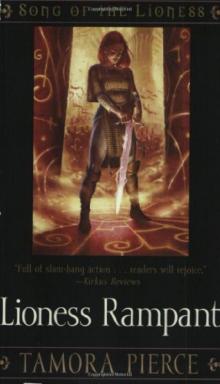 Lioness Rampant
Lioness Rampant The Woman Who Rides Like a Man
The Woman Who Rides Like a Man First Test
First Test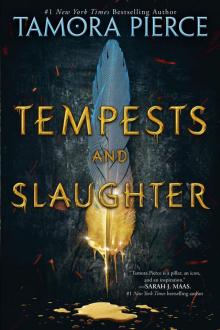 Tempests and Slaughter
Tempests and Slaughter Terrier
Terrier Trickster's Queen
Trickster's Queen Squire
Squire Briar's Book
Briar's Book Battle Magic
Battle Magic Page
Page Melting Stones
Melting Stones Wolf-Speaker
Wolf-Speaker Mastiff
Mastiff The Song Of The Lioness Quartet #1 - Alanna - The First Adventure
The Song Of The Lioness Quartet #1 - Alanna - The First Adventure The Circle Opens #2: Street Magic: Street Magic - Reissue
The Circle Opens #2: Street Magic: Street Magic - Reissue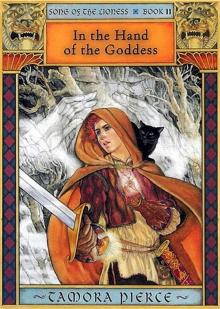 Tortall 1 - Song Of The Lioness #2 - In The Hand of the Goddess
Tortall 1 - Song Of The Lioness #2 - In The Hand of the Goddess Protector of the Small Quartet
Protector of the Small Quartet Beka Cooper 1 - Terrier
Beka Cooper 1 - Terrier Alanna
Alanna Trickster's Choice
Trickster's Choice Circle Opens #03: Cold Fire
Circle Opens #03: Cold Fire In the Hand of the Goddess (The Song of the Lioness)
In the Hand of the Goddess (The Song of the Lioness)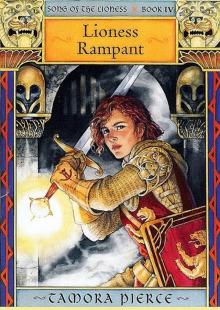 Song of the Lioness #4 - Lioness Rampant
Song of the Lioness #4 - Lioness Rampant Young Warriors
Young Warriors Tortall
Tortall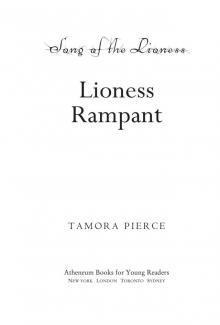 Lioness Rampant (Song of the Lioness)
Lioness Rampant (Song of the Lioness) Melting Stones (Circle Reforged)
Melting Stones (Circle Reforged) The Circle Opens #4: Shatterglass
The Circle Opens #4: Shatterglass